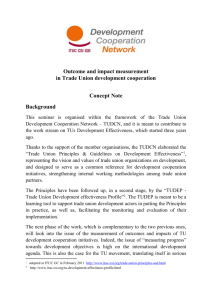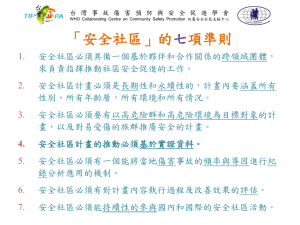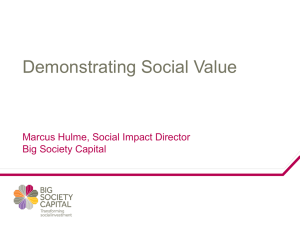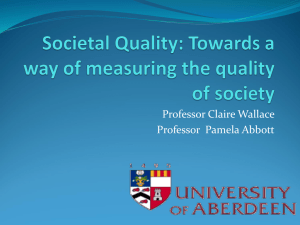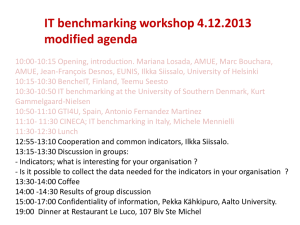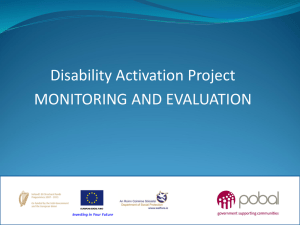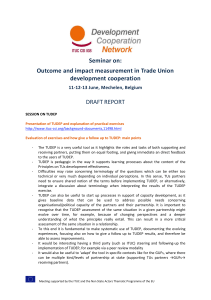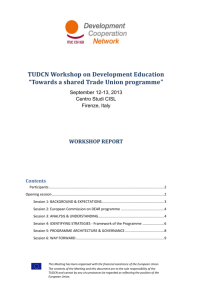REPORT October 3
advertisement
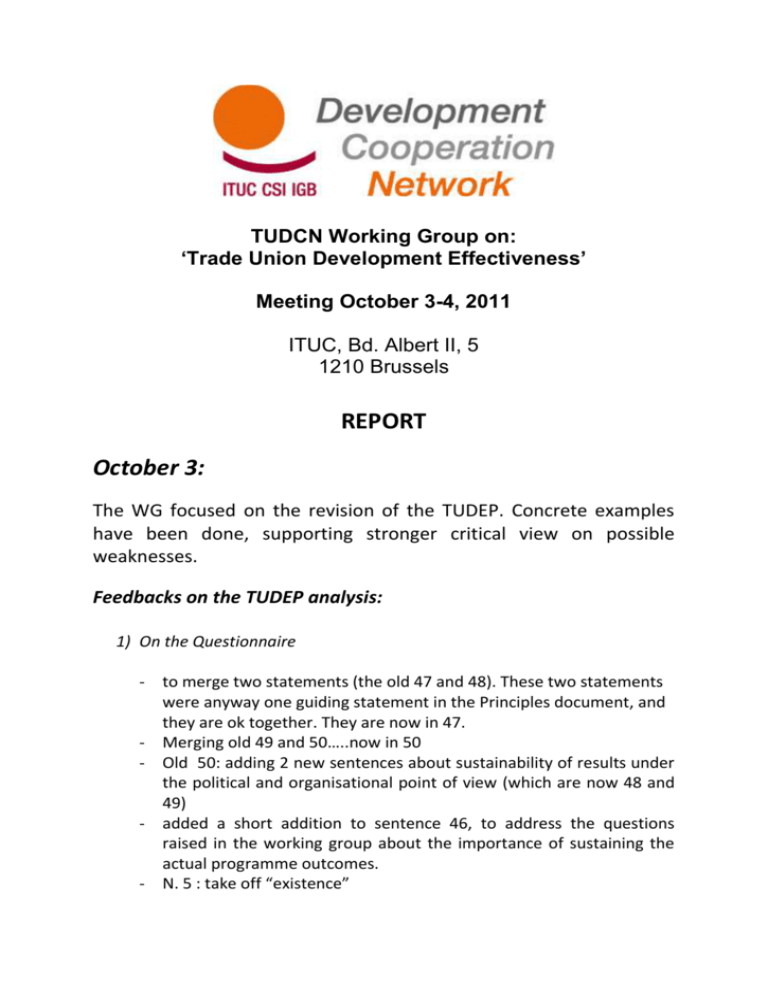
TUDCN Working Group on: ‘Trade Union Development Effectiveness’ Meeting October 3-4, 2011 ITUC, Bd. Albert II, 5 1210 Brussels REPORT October 3: The WG focused on the revision of the TUDEP. Concrete examples have been done, supporting stronger critical view on possible weaknesses. Feedbacks on the TUDEP analysis: 1) On the Questionnaire - to merge two statements (the old 47 and 48). These two statements were anyway one guiding statement in the Principles document, and they are ok together. They are now in 47. - Merging old 49 and 50…..now in 50 - Old 50: adding 2 new sentences about sustainability of results under the political and organisational point of view (which are now 48 and 49) - added a short addition to sentence 46, to address the questions raised in the working group about the importance of sustaining the actual programme outcomes. - N. 5 : take off “existence” - Correct the explanation sheet linking questions numbers to principles (see inclusiveness and sustainability) All changes are marked in red text and yellow cells. 2) On the Introduction Manual Specific Issues to be explained in the manual: - Questions describe ideal situation of partnership/development initiatives (educational profile). Therefore, respondents are supposed to assess whether or not and how much this is happening in their cases; - Respondents have to answer having in mind their current situation in current projects; - Marking STRONGLY DESAGREE = NOT RELEVANT questions (in exceptional cases) Structure of the Introduction Manual: - Objectives of TUDEP (essence: not science but a tool to start discussion, to spot critical points and to address them) - How to use TUDEP: adding “facilitator boxes” to help the management of the tool - Process Framework: defining “different scenarios” for the follow up phase; what to do after using the TUDEP. For example: integrating TUDEP in M&E methodologies of an organisation; spotting avenues to work on specific critical areas TO DO: → QUESTIONNAIRE TO BE UPDATED BY HUIB BY OCTOBER 13 Next steps to finalise the TUDEP The TUDEP will need to be finalised by the end of 2011. It will be officially launched during the next TUDCN meeting in Florence (December 2011). So far, the TUDEP: - Was tested in ACVLB seminar with African partners (September 2011) - SASK got feedback on TUDEP from its staff in LA - TUDEP was presented during TUCA regional coordination meeting which took place in August 2011 (sorry I forgot to mention it to you in our meeting!!!) - The TUDEP was sent to PSI for testing WG members will send the TUDEP to their partners (especially in Asia) to gather the last round of inputs in particular regarding “cultural sensitiveness” of the questions. Paola will also send it again to ITUC Regions. Opportunity to present the TUDEP during the seminar on “TUs support modalities” (to be organised in 2012) will be taken into account. In that case, we could take the advantage to present the tool to government representatives. TO DO: → LAST FEEDBACKS ON TUDEP BY NOVEMBER 13 →INTRODUCTORY MANUAL TO BE UPDATED BY HUIB AND PAOLA BY NOVEMBER 23 Way forward The TUDEP will be directly “promoted” also in the South, raising awareness on its objectives and modalities. The TUDEP (together with Principles & Guidelines) will be one the themes addressed by the seminars on capacity development that will take place at regional level (LA; Asia; Africa) in 2012. Indeed, the TUDEP contains strong elements to support organisational development, and as such very relevant to strengthen the capacity of organisations in building up better partnerships and synergies. Besides regional ITUC structures, the seminars will be attended by national TU centres in the South. Also the participation of GUFs at regional level will be highly encouraged, as the objective is to make TUDEP a shared and common tool for all TUs structures. A final seminar on capacity development at global level will be organised at the end of 2012, and main results on the implementation of the TUDEP will be presented, in particular: - Feedbacks on various modalities that can improve/make easier/more efficient the implementation of the TUDEP - Feedbacks on possible changes (behaviour of partners organisations or partnership modalities) which were triggered by the use of TUDEP October 4: The WG had a brainstorming on the work plan for 2012. Indeed, according to the TORs of the WG, the issue of indicators will need to be addressed. - Objectives Defining indicators for trade unions in development cooperation, focusing on their contribution to the implementation of the Decent Work Agenda (DWA) will be the objective of the WG in 2012. The DWA pillars will be taken as point of reference for the formulation of TUs indicators, as they represent the natural context for TUs initiatives in development. Furthermore, DW is nowadays recognised by governments and donors as one of the main policy priority in development. Therefore, building up indicators on the attainment of DWA objectives will certainly support the strength of TUs in better targeting their actions for socioeconomic development in the contexts where they operate. Moreover, indicators will also support TUs capacity in showing results on their impact against the DWA objectives. On this basis, the formulation of indicators will serve to: © assess progress in achieving results © assess their contribution in terms of DWA objectives © set a common and shared approach on how to measure impact - Methodology The WG decided to take initial parameters on how to build up indicators. Primarily, “high level” indicators will be established, taking into consideration the DWA components. Secondly, “progress markers” will be set for each indicator, so to allow measurement of improvement, and showing how the intervention could be redirected. Therefore indicators will be set at impact level, assessing the effects on final beneficiaries, as well as, at outcome level, measuring progress and supporting therefore organisational development. In order to do so, the WG decided to start from taking stock of what currently exists in terms of indicators within trade union partners. Therefore, a mapping will be carried out, gathering all relevant materials, experiences and practices around this theme. The ILO is also working on indicators on DW. The WG will also take stock on what elaborated so far by ILO in order to integrate the work. Finally, “Guidelines on TUs indicators in development” will be finalised by the end of 2012. TO DO: → WG MEMBERS AND SECRETARIAT WORK TOGETHER ON MAPPING TUS MATERIALS ON INDICATORS: OUTREACHING ORGANISATIONS1 AND GATHERING MATERIALS (OCTOBER-DECEMBER). RELEVANT MATERIALS SHOULD BE SENT TO THE SECRETARIAT. Since all WG members will attend the next TUDCN GM in December in Florence, we could organise a short meeting for info sharing and taking stock on what we have. - Timeframe proposal for 2012 Work Plan phase 1 November 2011 – March 2012 Mapping TUs existing practices on indicators: - documentation - interviews - reports on good practice projects Mapping and research: ILO studies and reports on indicators February: WG meeting…on-going 1 See as example FES, FNV, SASK, TUC, LO/TCO, CSC, CLC, Apheda, Jilaf review phase 2 April 2012 phase 3 Seminar on Indicators Day 1: - ILO practices (open to TUDCN members) Day 2: - TUs mapping results presentation - feedbacks on how to structure the indicators - Final session with members of the WG on TUs dev eff: way forward Development of Guidelines on TUs indicators April 2012 – October 2012 June: WG meeting…on-going review phase 4 - Guidelines Try out - WG meeting October 2012 – November 2012 phase 5 December 2012 ITUC/DCE/PS 10/10/11 Guidelines Finalisation
